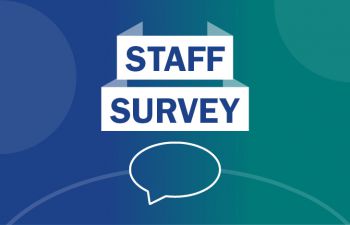How staff survey feedback has an impact at Sussex
Posted on behalf of: Staff Survey Steering Group
Last updated: Thursday, 10 October 2024

The staff survey is an important way for us to hear feedback and understand the issues that matter to colleagues across the University. Survey results also help the University, Faculties, Schools and Divisions build action plans which will bring about positive changes for staff, and you may have seen the case studies shared throughout the year which highlight some of the initiatives underway.
You can take part in the survey today through survey link emailed to you by People Insight, our survey partner. Alternatively, you can complete the survey via this link.
Colin Shipp, Executive Director of HR, said: “Putting people at the heart of our organisation is a core theme throughout our People Strategy, and staff surveys are an important way to listen to feedback, act on that feedback and measure our progress in delivering on this strategy.
“As shown by some of the examples we share below, previous surveys have informed a number of improvements. However, we are conscious there is more to do. The University Executive, along with local leadership teams, will be using the results from our current survey to inform action planning. I encourage colleagues to fill in the survey and share your feedback as it really does inform our activities at all levels and helps us prioritise improvements.”
Take a more detailed look below at some of the changes made in response to key themes raised in previous surveys, alongside other related work underway to improve the staff experience at Sussex.
Bullying and harassment
The 2022 survey results showed some improvement around bullying and harassment, with a higher number of staff saying they are not experiencing or witnessing these behaviours, in comparison with previous years. However, we know that there is a continuing issue with some staff facing unacceptable behaviour that has caused distress, so we are prioritising further work to ensure everyone is treated with dignity and respect.
We introduced the Report and Support tool for staff and students to report unwanted behaviour as a result of feedback in previous staff surveys. Those who disclose an incident through Report and Support, and provide their name and contact details, can speak with an advisor who will talk through options for support or further action. Themes emerging from submissions to the Report and Support tool are monitored as part of our inclusion work.
Our new Dignity, Respect and Inclusion Policy, which includes commitments to freedom of speech and academic freedom, was also launched recently.
Work continues to progress the commitments in our Antiracist Sussex Pledge, and new Advance HE antiracism training will be launched this autumn and available to all staff.
Workload and wellbeing
Following the joint agreement between the University and the University branch of the University and College Union (UCU) in 2022, we have progressed a number of actions relating to pay, working conditions, equalities, and workload, which directly tap into patterns of results that came out of previous staff surveys:
- Principles outlining fair, transparent and equitable workload allocation were approved by Senate in November 2022 and academic workload allocation approaches are in place within Schools
- A new Collective Agreement on Doctoral Tutor terms and conditions was agreed with UCU in June 2024 including increased sickness entitlement and a new tariff system to calculate workloads
- The University has established a £50,000 carers’ support budget fund and maternity leave has been enhanced
- Guidelines and templates for conducting Equalities Impact Assessments have been updated
In addition to this, we have enhanced our wellbeing offering for staff and their immediate families with a new Employee Assistance Programme from Spectrum.Life, alongside a range of other support services which are outlined on the refreshed Staff Wellbeing Hub.
The Staff Wellbeing Festival in July 2024 aimed to raise the profile of both staff wellbeing and resources available at the University to support staff.
Career development
Staff said in the last survey that they found the appraisal process difficult to navigate, so a new Achievement and Development Review process and training has been introduced, making it simpler and easier for staff to measure success and develop new objectives with their line manager.
Survey responses also told us that staff would like more career development so we widened our range of opportunities to include apprenticeships, mentoring, coaching, a wide-ranging learning and development offer spanning both professional and wellbeing and job shadowing. Staff can now also benefit from a range of free qualifications through our relationship with East Sussex College.
Leadership development was identified as important and the Leader and Manager Essentials programme has been redeveloped to align with our new Sussex Leader and Manager Competency Framework, which is linked closely to our University values and outlines the important leadership and management competencies expected at Sussex.
Actions underway across Schools and Divisions
Each School and Division has been focusing on their own local action plans which address specific feedback from staff in their area and. A wide range of activities are underway, or have been delivered, as a result of the previous survey – for example:
- the School of Life Sciences introduced a workload management system to ensure fairness of work allocation
- the ITS and Sussex Projects Division hears the views of staff more regularly in local pulse surveys
- the School of Psychology has introduced initiatives to tackle pandemic-related career inequalities
- the Human Resources Division supports a sense of belonging with improved induction and teambuilding initiatives
- the Business School has future-proofed staff career development with workshops and training to help build skills
- the Finance Division is building a culture of inclusion with events and awareness-raising activities
You can find out more about these and other actions underway across the University on our case studies webpage.
